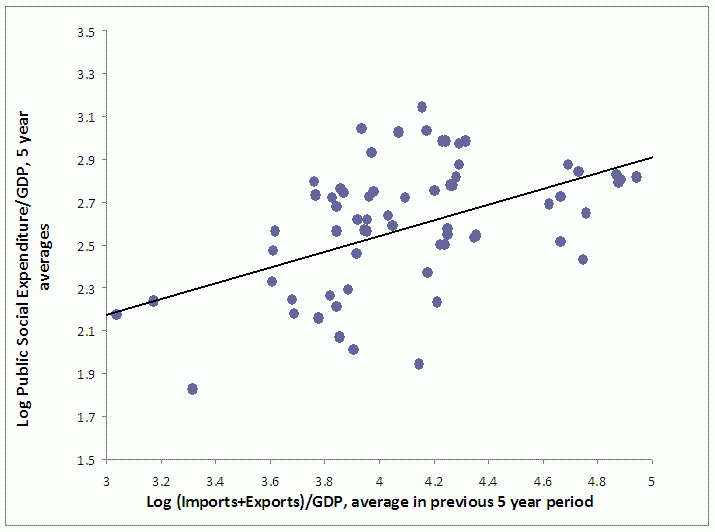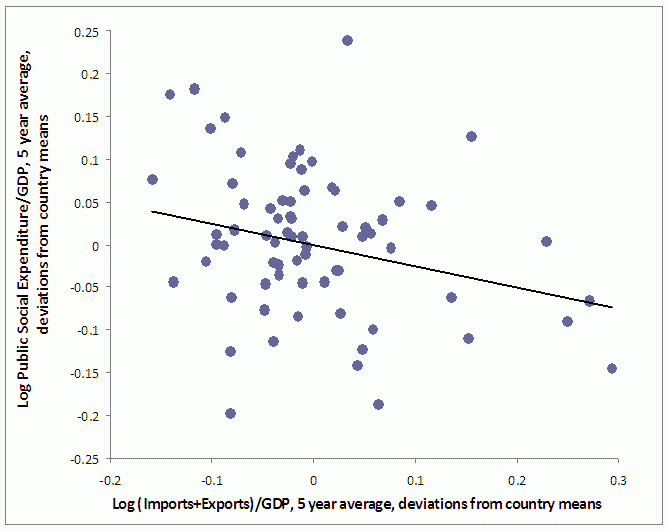The current global financial crisis highlights the vexed issues of what role national governments should and do play in an internationally integrated economic system. In Dani Rodrik’s (1998) classic analysis of data from the 1960s to the early 1990s, openness to international trade was found to be associated with a larger share of government in GDP. Government policies meant to shelter citizens from risk may indeed be more important in countries where international market access fosters opportunities to trade but also exposes workers to more frequent and intense shocks. More recent and precise data on social expenditure in 18 OECD countries confirm Rodrik’s observation. In Figure 1, the fraction of GDP spent on such policies is larger in OECD countries that import and export more, perhaps because they are small and near to each other or because they choose to deregulate international trade.
Figure 1. Public social expenditure and trade openness
Another mechanism is relevant, however. Redistribution may be more useful in more open economies but national governments are less powerful if economic integration allows private agents to seek more lenient taxes and more generous subsidies across countries’ borders. Competition among systems (Sinn, 2003) may reduce the viability of collectively enforced national policies, making income redistribution negatively associated with international openness. It is not difficult to find such a relationship in the data. In Figure 2, we plot deviations from countries’ means of social expenditure and openness, which capture reasons for countries to be permanently more or less open, or more or less inclined to social expenditure. The relationship is negative. This suggests that as technological progress and multilateral trade liberalisation have made borders less of a barrier to economic activity, the scope of redistribution policies has become smaller.
Figure 2. Public social expenditure and trade openness, deviation from means
As an increasingly globalised economic system increases the risk households face and makes it harder for governments to enforce redistribution policies, something has to pick up the slack. Our CEPR Discussion Paper 7048 finds that, controlling for country and time effects, the negative association between openness and redistribution illustrated in Figure 2 is more pronounced when and where financial markets are better developed. As globalisation progressed, financial development substituted for government policies. In theory, this makes a lot of sense. Financial markets must indeed be more important if international competition makes it difficult to implement social protection schemes while introducing new sources of income risk. In a more risky world, absent heavily redistributive national welfare states, credit and insurance volumes have to increase.
Globalisation increases aggregate incomes but erodes redistribution, and it could decrease welfare if it were not accompanied by better insurance against new and larger risks. In our empirical work, following Jappelli and Pagano (1994), we proxy the accessibility and efficiency of household financial markets by loan-to-value ratios – the percentage of a house purchase price that may be financed by mortgages. Available indicators are significantly and sensibly related to openness and social policy developments. Over time, loan-to-value ratios increased from about 75% on average in the 1980s to about 90% in the 2000s. They differed sharply across countries in the 1980s, when loan-to-value ratios already exceeded 80% in the UK and the US but were only slightly above 50% in Italy and Greece. By the late 1990s, the loan-to-value ratios in all our OECD countries exceeded 70%, and by the early 2000s they ranged up to 115% in countries such as the Netherlands.
From the perspective of this column, a high loan-to-value ratio is a good thing. Borrowing allows households within countries to buffer the ups and downs of international competition without having to rely on collective redistribution and makes it possible to reap the fruits of globalisation in terms of overall competitiveness. For individual households, it is beneficial to be able to borrow a lot and go bankrupt upon negative income shocks. But there can be too much of a good thing.
If individual repayment risk is not properly packaged and diversified, financial market development can be a source of aggregate instability. Financial markets are indeed in trouble and, if our perspective on past developments is correct, their fragility does not bode well for globalisation. The breakdown of private financial markets excites calls for stronger redistribution. If redistribution is national (as it has to be as long as politics are national), it will only be sustainable if national borders become less permeable to economic activity.
Researchers will be looking carefully at signs of such reversals. Not only financial market development, but also trade and social policies will change as a consequence of the current economic turmoil. The character of these developments may foster confidence in the structural character of the empirical relationships we detect in our paper, which could so far be spuriously driven by trending factors other than those we focus on.
And policymakers should also be keenly aware of these mechanisms. The path that led to the Great Depression was paved by protectionism and an increasing role of government. Rescuing financial institutions fosters confidence, but using the rising power of governments in the current financial storm to bail out manufacturers distorts competition and reduces confidence in further economic growth. To steer clear of the Great Depression path in a world where redistribution is no longer very effective and financial markets are key to the sustainability of international integration, we must develop an internationally coordinated financial regulation framework and avoid retracing backwards decades of international integration and financial development.
References
Bertola, Giuseppe, and Anna Lo Prete (2008), “Openness, Financial Markets, and Policies: Cross-Country and Dynamic Patterns', CEPR Discussion Paper 7048.
Jappelli, Tullio and Marco Pagano (1994), "Savings, Growth, and Liquidity Constraints", Quarterly Journal of Economics, 109(1), 83-109.
Rodrik, Dani (1998), “Why Do More Open Economies Have Bigger Governments?,” Journal of Political Economy, 106(5), 997-1032.
Sinn, Hans-Werner (2003), The New Systems Competition, Oxford: Blackwell Publishing.





